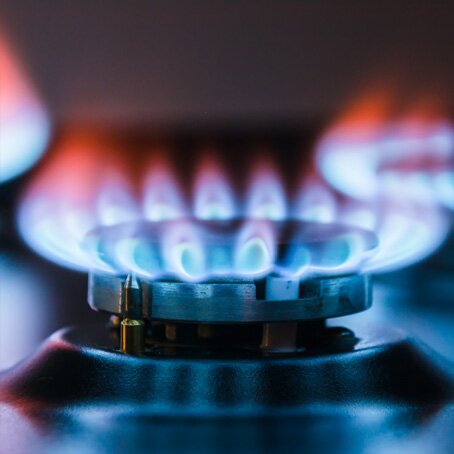What’s the Difference Between Natural Gas and Propane?

As experts in everything natural gas, we field a lot of questions about this clean-burning and abundant source of fuel here at Gas South. One we hear quite often is: What’s the difference between natural gas and propane? So, as a company always seeking to deliver extra value to our customers, we thought we’d tackle that topic in our blog this week so you can be in the know. Read on to learn more.
Table of Contents Propane versus Natural Gas: The Differences Propane Versus Natural Gas: The Similarities |
Propane Versus Natural Gas: The Differences
- Origins: Both natural gas and propane are considered fossil fuels, meaning they’re produced from ancient, decaying plants and animals deep below the surface of the earth—people find evidence of these plants and animals as fossils. Of course, a small percentage of natural gas these days is collected from decaying organic material in landfills—it’s called renewable natural gas, and it’s proving to be an important energy resource in the push for sustainability. But most natural gas is harvested through drilling underground, where it’s then piped to a refinery. Propane, on the other hand, doesn’t exist naturally and is, in fact, a byproduct of natural gas processing and the refining of crude oil and petroleum.
- Composition: Natural gas is mostly made up of methane (97%) but also contains smaller amounts of other higher alkanes, as well as low levels of gases like carbon dioxide, hydrogen sulfide, nitrogen and helium. Its molecular formula is CH4. Propane is a three-carbon alkane with the molecular formula C3H8.
- Storage and Transport: As we mentioned above, natural gas is usually transported through pipelines. It can be stored in several ways: in underground reservoirs, in tanks above ground or in the pipes it’s being transported through. It can also be turned into compressed natural gas or liquefied natural gas to make transport easier. Propane is always stored in tanks of some sort in its liquefied form, which can make transport easy to places where natural gas can’t be delivered—typically because the infrastructure doesn’t exist in those places.
- Affordability: Although both fuel sources remain two of the most energy efficient and cost effect, prices can vary, especially when we compare them to each other in different scenarios and markets. In some cases, propane is the more affordable option, but this tends to not be true in places where natural gas infrastructure is already set up. If you have access to natural gas, it’s likely you’ll save on your energy expenses using this option as a fuel, and it can be piped directly to you without much thought on your part. Propane, however, isn’t typically delivered through pipes this way, which means it will be delivered periodically by a truck when it’s needed for purposes like heating. When the truck arrives, the operator will refill a tank that sits outside your home or business. For occasional use that requires small amounts of propane (like a gas grill), it can be purchased in small tanks at any number of stores and retail outlets.
Propane Versus Natural Gas: The Similarities
- Uses: As we noted above, natural gas and propane are stored and delivered in different ways, as either a liquid or gas, and that can affect accessibility and cost. But both are commonly used for heating homes and businesses, cooking, backyard grilling, heating water and as fuel for vehicles, equipment and appliances.
- Safety: Both natural gas and propane are considered safe sources of fuel and are highly regulated to keep them that way. An example of this is the odorant added to each because both, without help from industry, would be hard to detect in the case of a leak. To help with this, a foul-smelling odorant, mercaptan, is added to both to make it obvious when there’s a leak.
- Sustainability: When compared to propane, natural gas is the more widely used choice for several reasons—cost and availability, as we discussed above, are two of the biggest. But both are highly efficient, clean-burning forms of fuel, and they’re helping lead the way to a more sustainable way of life—see more about this in our blog on natural gas as a bridge fuel to cleaner energy.
Looking for great natural gas prices and service in Georgia?
See Your Plans